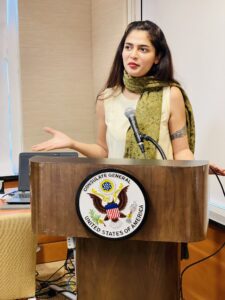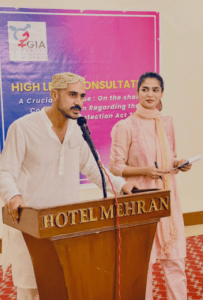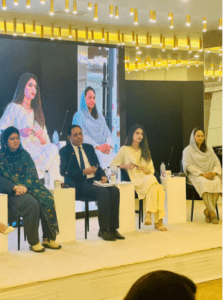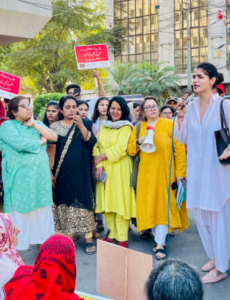Embarking on a challenging journey in Pakistan, the quest for gender equality and acceptance of transgender rights has been marked by significant milestones and persistent challenges. In this context, Observer Diplomat brings you an exclusive interview with Shahzadi Rai, Pakistan’s First Transgender Council Member. Delve into her inspiring journey, commitment to transgender inclusivity, and vision for international cooperation as we navigate through the complexities of progress and ongoing struggles in the battle for equal rights.
It has been a difficult journey in Pakistan to achieve gender equality and the acceptance of transgender rights, marked by both significant milestones and persistent challenges. While progress has been made in recent years, the battle for inclusivity and equal rights for the transgender community continues to be a work in progress.
Historically, transgender individuals in Pakistan, often referred to as “khwaja siras” or “hijras,” have faced systemic discrimination and societal marginalization. Their access to possibilities for work, healthcare, and education has been restricted, pushing them to the periphery of society.
Despite great progress, there is still more to be done in Pakistan to fully recognize transgender rights. The efficient execution of current laws as well as the creation of comprehensive policies that cater to the many requirements of the transgender population are still top priorities for activists and advocates.
The continuous struggle for complete transgender rights in Pakistan is characterized by tenacity and the steadfast dedication of those working to create a more inclusive and fair society for everyone. It is a voyage that serves as a reminder of the value of group activism as well as the necessity of defending the rights and dignity of every person, regardless of gender identification.
Some people stand out as living examples of resiliency, fortitude, and an unrelenting dedication to creating a more inclusive society in the ever-changing environment of social transition. Shahzadi Rai is the Pakistan’s First Transgender Council Member. Shahzadi Rai’s historic appointment as the first transgender person to serve on the Karachi Metropolitan Corporation (KMC) City Council is a testament to her unwavering determination and the immense progress that Pakistani society is making towards inclusivity and equality.

As a violent case manager at the Gender Interactive Alliance prior to her landmark appointment, Shahzadi Rai had dedicated her career to the causes of advocacy and justice. She worked tirelessly to promote the legal rights of Pakistan’s Khwajasira group and work for a more just society for everyone.
Her story is a powerful illustration of the human spirit’s indomitable resiliency, showing how it can overcome hardship and spark transformational change with effects that go well beyond personal success. In this special edition, we are honored to commemorate the extraordinary work of Shahzadi Rai, Pakistan’s First Transgender Council Member, a pioneering champion of transgender rights, and share her inspiring journey so that more individuals may find inspiration in her remarkable story.
1. Congratulations on your historic appointment to the Karachi Metropolitan Corporation (KMC) City Council. Your appointment is seen as a significant milestone for transgender rights in Pakistan. You are now the Pakistan’s First Transgender Council Member. Could you describe the journey and challenges you faced in reaching this point, and what message your success sends to other transgender individuals in the country?
When I embarked on this journey to secure rights for our community some 13 years ago, we faced numerous hurdles and obstacles that persist to this day. Back then, the transgender community lacked acceptance and legal recognition. While we’ve made strides in gaining legal status since then, we continue to grapple with hatred and discrimination based on our gender identity. Frequently, people misgender us, erroneously labeling us as “men.” My journey transformed significantly upon joining KMC, yet it’s important to acknowledge that challenges persist. Becoming a part of KMC doesn’t signal the end of difficulties and hardships.
2. Transgender rights have been gaining international attention in recent years. How can your appointment serve as a positive example for other countries working towards greater inclusion and representation of transgender individuals in politics?
Take, for instance, Western countries where a new world order has seen a rise in hate crimes against the transgender community. Transphobia is gaining ground, particularly in Pakistan. In this context, my appointment as a KMC member, becoming the Pakistan’s First Transgender Council Member, stands as a reminder and an example that we can engage in ordinary, productive work, particularly in fields like politics and social activism that are often considered challenging. While there’s still progress needed in Pakistan’s legal landscape, it’s heartening to see recognition from entities like the Islamic Republic of Pakistan and its government, especially the Sindh government. Other nations should follow suit. We don’t seek special privileges, just basic human rights to facilitate our participation in politics and social work and to live in this world.

3. Can you elaborate on the specific initiatives or policies you hope to champion during your tenure in the KMC City Council, particularly those aimed at addressing the unique needs and concerns of the transgender community?
Upon my initial involvement with KMC, my foremost priority was my community and its well-being. However, certain matters fell outside KMC’s jurisdiction. I’m currently in discussions with the mayor to create employment opportunities for the transgender community within KMC. Additionally, we’re working on implementing workplace harassment policies, which, although covered by existing laws, need specific KMC policies. These policies encompass both women and transgender individuals to minimize discrimination. We’re also striving to pass a public space resolution in KMC, which will prominently display notices outside public areas, explicitly forbidding discrimination based on color, caste, or gender. This resolution is crucial to combat the discrimination transgender individuals face when denied access to public spaces like parks. Furthermore, we’re working towards gender-neutral restrooms in the future. Just as there are restrooms for men and women, there should be restrooms for transgender individuals. The mayor has shown support for this idea, and we’re awaiting the release of funds to initiate the project.
4. In what ways can international organizations and diplomatic efforts support the advancement of transgender rights and inclusion in Pakistan and beyond?
International organizations have the potential to make a substantial impact, but it appears they may be hesitant, possibly due to the current controversy surrounding the transgender community, often fueled by religious extremist groups. To address this issue, we must first target these hate groups propagating hate speech online and collaborate with them to curb hate campaigns against marginalized communities, including feminists, women, and transgender individuals. This endeavour would greatly benefit from the assistance of major tech companies, such as Meta and YouTube, to monitor and remove content violating community rules.
5. Discrimination and violence against transgender individuals remain pressing issues in many parts of the world, including Pakistan. How do you envision using your position to combat discrimination and promote tolerance and acceptance?

KMC’s jurisdiction is limited, covering only 60% of Karachi. However, we’ve engaged with the Sindh police, thanks to a meeting organized by the mayor. While there have been changes in laws, constitutional reform is necessary, as our current constitution allows for the payment of blood money under Diyat Qanoon in cases of murder and violence. This practice remains persistent in Pakistan, leading to the closure of numerous cases. Therefore, we initiated the Sindh Moorat March last year to call for the abolition of Diyat Qanoon for the transgender community. Until laws and legal processes undergo reform and amendment, controlling violence remains a significant challenge. Though bringing substantial change to a country like Pakistan is challenging, we must persevere and maintain hope.
“Our movement embraces diversity and inclusivity, celebrating the strength of our collective voices.
Let us come together to advocate for equality and justice.“
– Shahzadi Rhai
6. Your appointment aligns with Sustainable Development Goal 5, which focuses on gender equality. How can your work within the KMC City Council contribute to achieving gender equality and social inclusion more broadly in Pakistan?
Regarding social inclusion, my interactions with politicians have increased my visibility, benefiting both me and my community. A positive wave is gradually making its way into the political sphere, ensuring that future KMC projects will include the transgender community. For instance, we’re marking cycling tracks specifically for women and transpersons, representing small but meaningful milestones. I aspire to extend these achievements beyond Karachi, so that people across Pakistan view us as fellow human beings deserving of basic rights and dignity, integral to the country and its communities.
7. The media plays a vital role in shaping public perception and awareness. How do you see your role in leveraging media attention to promote positive narratives about transgender individuals and issues?
While I agree that media plays a pivotal role in raising awareness, it’s essential for the media to be transparent about our narrative. Media organizations and personnel need to be sensitized about the transgender community to ensure accurate representation.
Despite their attempts at inclusivity, they sometimes miss the mark or fail to represent us accurately. This highlights the urgency of spreading awareness about our community. In the past, media shows I participated in often invited religious clerics or trans-activists to create controversy and boost ratings. To rectify this, media outlets should clarify their stance on the transgender community, which requires a deep understanding of our needs and demands.
8. Your story is one of resilience and courage. How can international diplomacy and cooperation help create an enabling environment for transgender individuals to achieve their full potential in society and leadership roles?

International communities often fall short when it comes to portraying our issues, particularly in the context of Pakistan, where hate campaigns can easily gain momentum on social media. Addressing this problem requires international diplomacy and cooperation with tech giants like Meta and YouTube to control such content.
Unfortunately, these campaigns lead to inappropriate personal inquiries, violating our privacy. While advocating for our rights is easier in the West, we face unique challenges in Pakistan, where we’re treated as a third gender, necessitating a continuous battle for even basic rights like education and access to public spaces. Despite these hurdles, we must stand firm and united, as change is possible with the right support and recognition.
9. Lastly, looking ahead, what are your long-term aspirations and hopes for the transgender community in Pakistan, and what role do you see yourself playing in achieving these goals?
Regrettably, I initially lost the case challenging shariat law to secure our basic rights, facing labels of being un-Islamic. However, I remained resilient and took the matter to the Supreme Court, despite receiving numerous threats. It’s crucial to establish our identity to prevent future difficulties resulting from public unrecognition. During election periods, religious parties target us for their gain by portraying us as a threat to Islam. However, Islam’s teachings promote kindness toward all living beings, making it resilient against any perceived threat. We cannot allow negative narratives to deter us. Despite many activists leaving Pakistan for their safety, I refuse to abandon this country or this fight. It’s a fight for our individuality, identity, and rights. While the path can be daunting, with the right support and recognition, we can triumph in any arena.
The interview has been published in the last edition of Observer Diplomat Magazine ” Gender Equality for a better tomorrow” Click here for more information
Follow Shahzadi Rai in her social media and support her journey:
















